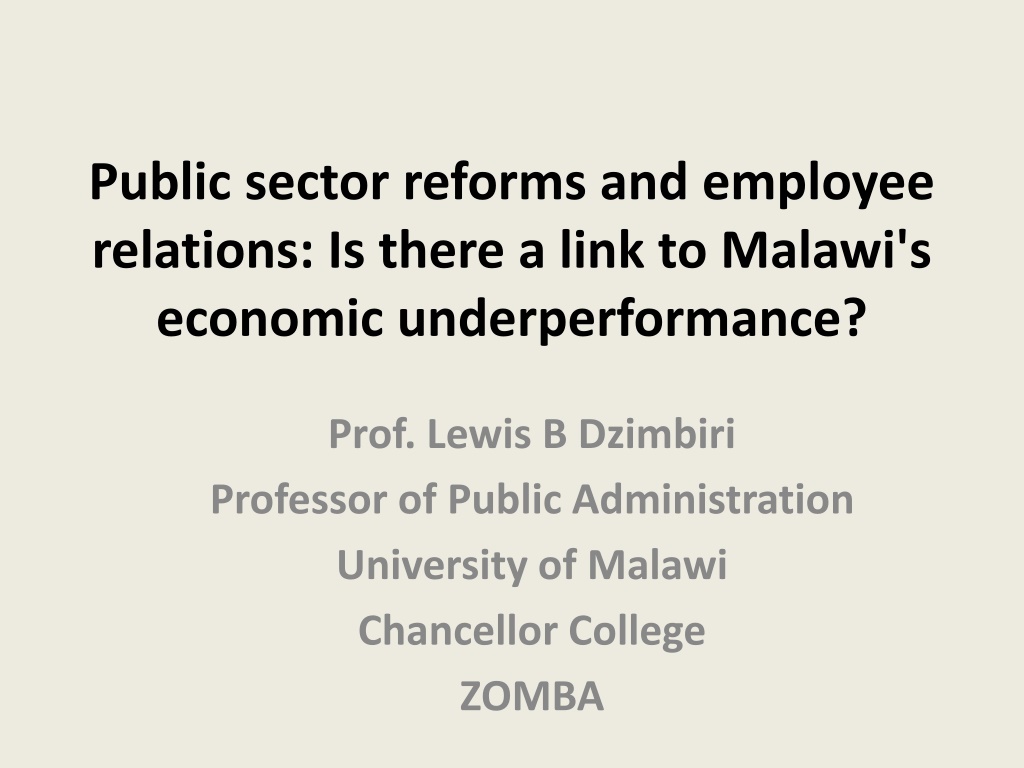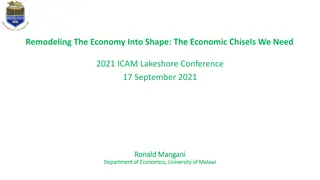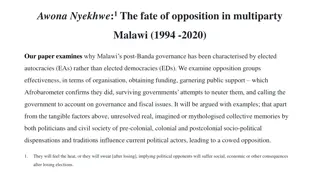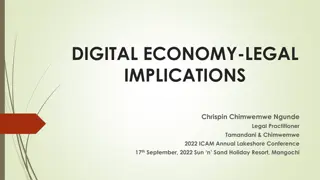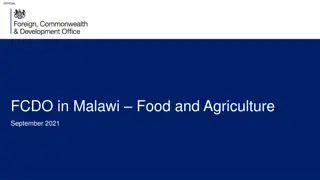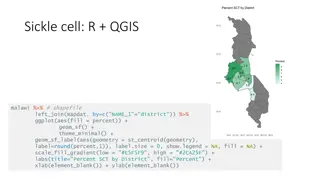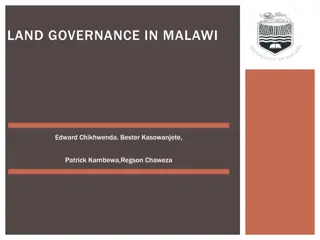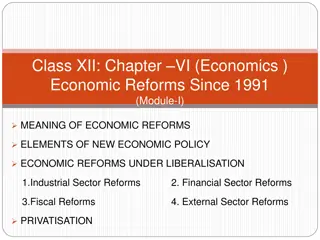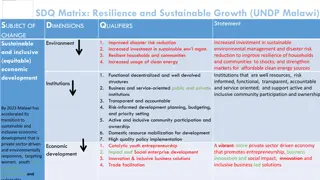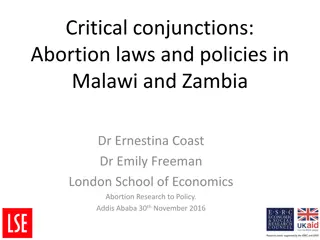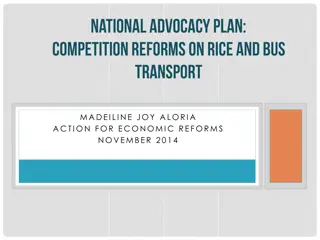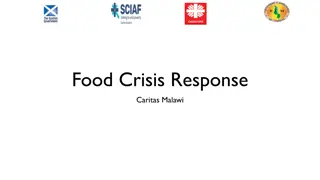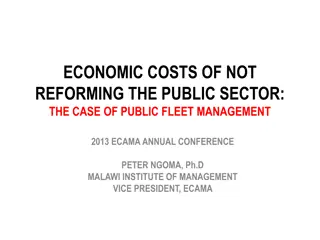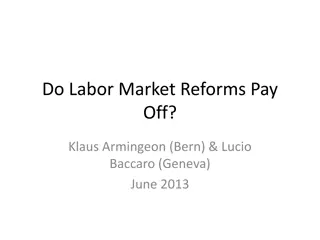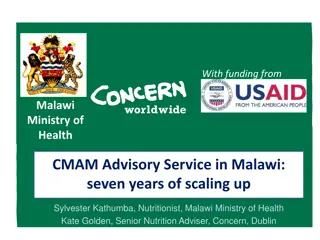Public Sector Reforms in Malawi: Impact on Economic Performance
The presentation explores the link between public sector reforms and economic underperformance in Malawi. It discusses the history of public sector reforms in Africa and Malawi, employee relations, and various generations of reforms. The context of Malawi's economic realities at independence and responses such as political, economic, and legal reforms are also analyzed.
Download Presentation

Please find below an Image/Link to download the presentation.
The content on the website is provided AS IS for your information and personal use only. It may not be sold, licensed, or shared on other websites without obtaining consent from the author. Download presentation by click this link. If you encounter any issues during the download, it is possible that the publisher has removed the file from their server.
E N D
Presentation Transcript
Public sector reforms and employee relations: Is there a link to Malawi's economic underperformance? Prof. Lewis B Dzimbiri Professor of Public Administration University of Malawi Chancellor College ZOMBA
Broad presentation outline Aims and rationale of public sector reforms in Africa and Malawi Window-shopping of reforms implemented in Malawi Promise and Performance critical reflection Employee relations as another explanation Employee relations in Malawi- past and present Other approaches to improve performance
Public Sector Reforms in Africa At independence- challenges on economies- Demand for socio socio-economic development - health, education, social infrastructure etc vs acute shortage of human, material and financial resources extensive needs, low capacities, severe obstacles (Schaffer 1969).
Generations of reforms FIRST GENERATION- AFTER INDEPENDENCE SECOND GENERATION- A DECADE OR SO LATER THIRD GENERATION- 1990s AND BEYOND
MALAWI: Realities at independence Unbalanced economic development (colonial neglect) Dearth of indigenous entrepreneurial class Absence qualified Human resources- (colonial heritage)
Response: State took over national development agenda Use of public sector ministries and depts, parastatal bodies, nationalisation Use of elite business enterprise Banda s business empire; political elite and their businesses; 1968/9 policy on Asians in the rural areas!!! Use of quasi-state institutions- MYP as training and national productivity centres- Nasawa, Amalika, etc
Typology of reforms in Malawi Political reforms Economic reforms Legal reforms Reforms in planning Decentralisation Judiciary reforms Parliamentary reforms Police reforms Prison reforms Doing business reforms Procurement reforms
Legal reforms A new 1994 Republican Constitution was promulgated in 1994 providing for an independent Executive, Legislature and Judiciary. Provides for good governance and respect of rule of law institutions- Malawi Human Rights Commission, the Ombudsman, the Law Commission and the Anti-Corruption Bureau as constitutional bodies; and other institutions geared at entrenching governance
LEGAL REFORMS RELATED TO PUBLIC SERVICE MANAGEMENT The Public Service Act was promulgated in 1994 which among other key issues provides for the core functions of the Public Service; the responsibilities and duties of the offices of the Secretary to the President and Cabinet and the Secretary for Human Resource Management and Development ;
others The need for predictability, accountability and transparent of the operations of the public service. Other legal reforms to enhance transparency and accountability in the Public Service -Public Finance Management Act (2003), the Public Procurement Act (2003) and the Public Audit Act (2003 Labour relations Act Employment Act. New regulations and procedures on the management of the public service (MPSR)
Reforms in planning The development and adoption of the Malawi Vision 2020 had ushered in the imperative to reform the Public Service MPRS (1996-2004) MGDS(2007-2011, 2011-2015). ERP Desire for an efficient, effective and transparent Public Service was seen as the key factor to the successful realization of democratic, highly developed, socially, economically and politically just Malawi.
Democratic governance & rule of law Reforms in the sectors have focused on improving policy formulation, service delivery systems and technical capacities and human resource skills and competencies. Health, education, water, roads and agricultures sector have implemented more robust reforms.
Parliamentary Reforms Parliamentary Reforms aimed at improving management of the National Assembly , management of the interface between the Legislature and the Executive, between the Legislature and the Judiciary, between the Legislature and the Civil Society; and enhancing the capacity of Parliamentary Committees and of Members of Parliament.
Judicial reforms The objective of Judiciary reforms is to enhance access to justice delivery systems by most ordinary citizens, creating a framework for traditional justice systems, and introducing frameworks for engaging the none-state actors in alternative dispute resolution mechanism
Police reforms A Police Reform Programme commenced in 1995 guided by a strategic plan to guide the reform process. The strategic objective of the Reform Programme is to transform the Malawi Police from being a force to being a service in maintaining Law and Order in an independent and professional manner, Characterized by compassion, sound judgment, respecting the sanctity of life and death, never accepting unlawful rewards and demonstrating willingness to change in the face of justified criticisms from the public
Prison reforms Functional review of the Prison Service, development of Strategic Plan and review of the Prison Act.
Doing Business Reforms Government has embarked on improving the regulatory environment in which the private sector operates; and strengthening the institutions that protect private property rights, and allow speedy and low cost business setting up facilitation.
.. It has also strengthened capacity of private sector development support institutions and services in order to improve the quality and volume of services delivered Government has been enhancing Public Private Partnership (PPP) with focus on developing an enabling policy and legal framework to promote and regulate PPP
Procurement Reforms Promulgation of the Public Procurement Act of 2003 and the establishment of the Directorate of Public Procurement Procurement resulted in the liberalization of the public procurement functions and allowing the out sourcing of goods and services
Parastatals Reforms The Parastatal Sector has been subjected to reforms from 1998 when government approved privatization of some parastatals providing of services and goods which the private sector had a comparative advantage. The privatization of some parastatals was implemented within the context of reduced state role in the economy and allowing for liberalized market economy.
PROMISE AND ACHIEVEMENT To what extent have public sector management reforms achieved their intended goals? Effort to combat corruption ? Police reforms ? Prison reforms ? Efficiency and effectiveness in the public service ?
Service delivery in government departments- impressionistic view. .. Administrator general ? road traffic ? Immigration ? Timely payment of salaries in education Extension services in agriculture Health service delivery????
DISCUSSION QUESTION.. TO WHAT EXTENT CAN WE ATTRIBUTE MALAWI S ECONOMIC UNDERPERFORMANCE TO FAILURE OF PUBLIC SECTOR REFORMS?
REASONS FOR FAILURE OF PSRs Worldwide, most public sector reforms have not produced the results as expected. Reasons are legion- funding, political will, poor coordination, lack of participation, inadequate technical and administrative capacity
EMPLOYEE RELATIONS- ANOTHER EXPLANATION!! Do employers, government managers understand the role of the human factor in the implementation of reform programmes and projects? Is it known that the human resource is both a subject of reform as well as an object of reform, Both a facilitator as well as a victim of some reforms? If poorly done turning human resources into victims, reforms can be counter-productive.....
.. If done with a human face in mind, they can enhance efficiency and effectiveness. Issues of employer-employee relations and the climate created at the workplace is crucial in understanding success or failure of reforms EMPLOYEE RELATIONS
What is Employee relations? the relationship between employer and employees in paid employment: the ways employees are recruited, selected, appointed, promoted, rewarded, motivated, trained and disciplined
Good employee relations lead to: Lower level of industrial grievances and disputes Industrial peace Higher worker productivity Investor-friendly environment High employment through more new investment THE OPPOSITE IS ALSO TRUE
Major phases of employee relations in Malawi Colonial period 1930s- 1963- Independent one party period 1964-1991- Multiparty period 1992- to date
Forces that dictated State-labour relations 1964-1991 Economic Development Political stability
Impact of Economic and political policies on employee relations Trade unions streamlined from 19 to 5 Some trade union leaders run into exile during the cabinet crisis Trade unions integrated into the party structures (BT Mayor as Chairperson of the TUCM) Spies planted at workplaces causing fear to articulate grievances
Contd Trade union leaders became stooges and had to dance the song of the state. Trade unions failed to protect the interests of workers- wages, freedom to bargain for fair wages, freedom of association was heavily restricted by the Trade Union Act 1958 Strikes were restricted by the Trade Dispute Act 1952
Contd The Ministry of Labour was docile making workers vulnerable to exploitation by private sector employers Workers could not bargain for wages and improved conditions of service Grievances and disputes were suppressed Between 1982-1992 minimum wage had fallen by 58 points- below poverty line (GoM, 1993)
Transition to Multiparty Democracy Pastoral letter Internal pressures for change in Malawi Wind of change Chafufwa Chihana Pressure groups Donor community Strikes 1992-93 National Referendum 1993 General Elections 1994 POLITICAL CHANGE TO MUTLIPARTY DEMOCRACY Basic human rights Basic freedoms Berlin wall Southern Africa
WIDESPREAD STRIKE ACTIVITY 1992-93 Unprecedented strikes in the major cities of Blantyre, Lilongwe and Mzuzu Starting from 5 May at David Whitehead and Sons in Blantyre- spread throughout the country Over 300 strikes involving 300,000 workers and close to a million person days lost in 8 years
EFFECT OF THE 1992-93 STRIKES ON INDUSTRIAL RELATIONS Policy on trade unions and collective bargaining 1993 Constitutional provisions on labour rights 1994 draft constitution Renewal growth and development of trade unions from 5 docile to 12 in 1994...............27 in 2009
.. Creation of industrial Relations Court Labour Relations Act 1996 Employment Act 2000
Examples of trade unions in Malawi Teachers Union of Malawi Agriculture and Plantation workers Civil Servants Trade Union Hotel, food processing & catering Sugar allied workers union
.. Building construction civil engineering workers union Commercial, industrial & allied workers Textile garments and leather ESCOM staff workers union CCASU
successes Collective bargaining- bargained for improved conditions and better wages Successfully pressurized employers through protracted strikes- cf 3 months judiciary strike; recent civil servants strike yielding 61% for lowest paid etc Participation in major policy issues- labour reforms etc 18 out of 27 trade unions registered a Collective Bargaining Agreement (CBA) by 2009.
Challenges Trade Unions (organised workers)face Divide and rule tactics Hide and Seek tactics
Divide and rule Creation or sponsorship of splinter unions to weaken worker solidarity Buying off leadership of trade unions Promotion of union leadership in bad faith Posting away critical leaders to remote areas Intimidating employees by threatening to sack them if they get involved in trade union activities Union members rated low performers a ploy to deny bonuses
Hide and seek Delaying recognition of trade unions as bargaining unit Labeling trade unionists as opposition agents Delaying tactics mostly in implementing agreements Changing negotiating team members Use of state apparatus like the police to suppress labour rights Unilateral decision making and pronouncements by employers including the state to make unions redundant
Malawi Vision 2020 By 2020, Malawi as a God-fearing nation will be secure, democratically mature, environmentally sustainable, self-reliant with equal opportunities for and active participation by all, having social services, vibrant cultural and religious values and being a technologically driven middle-income economy. Malawi Vision 2020
Malawis Growth and Development Roadmaps 1. Malawi Vision 2020 2. Malawi Growth and Development Strategy II (MGDS II) 3. Malawi Economic Recovery Plan (ERP)
Public sector reforms, employee relations and Economic development Economic growth Malawi has enjoyed since independence can be attributed to the role of workers in various capacities in the public and private sector. the overall performance of a national economy is a product of individual organizations Performance put together. The human resources of a nation- not its capital or raw materials determine the character and pace of its economic and social development
.. Economic growth and development cannot be achieved without substantial investment in human capital in the form of skills development. Skilled human resource is indispensable for any country aspiring to develop its economy and advance aspirations of its people.
,, A country which has a pool of human resource in critical skill areas can produce economic miracles even if it is devastated or less endowed by natural resources.. The Asian Tigers which exploited their scientific, technological and innovation capacity to make socio-economic breakthroughs are cases in point.
Harnessing workers The need to harness a conducive environment for human resources of any nation through sound employee relations is the surest way of tapping the vast potential in the professional, technical and administrative/management staff that a nation has The achievement of Vision 2020, MGDS 11 and the ERP will depend on the nature of relationship between employers and employees in the production of goods and services
Recent employee relations tensions in Malawi Protracted Academic freedom saga 20 11 UNIMA STAFF AND COUNCIL Three months Judiciary workers strike 2012 Three weeks Civil servants strike 2013 More others in private and statutory bodies and local authorities: Lilongwe water board, Bt City Assembly etc
